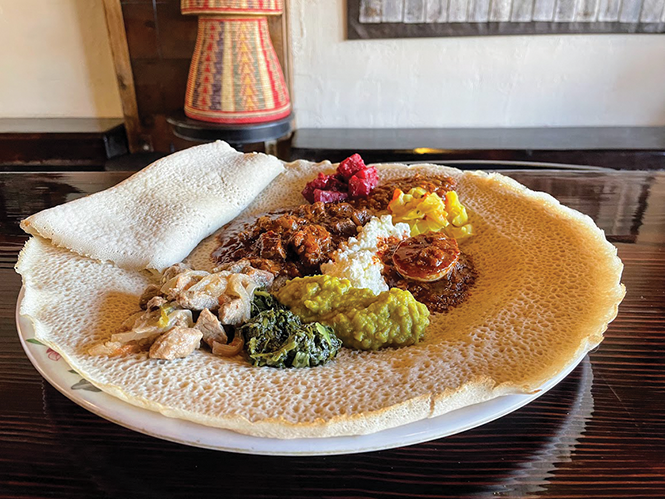
Amid all the exhaustion and desperation that continues to plague our hospitality industry, we have had our share of triumphs. Regrettably, the triumphs aren't as numerous as the defeats, but I like to do what I can to amplify the players in our local restaurant scene that have taken a wallop, only to reinvent themselves and throw it all back into the fight.
Oromian Restaurant (1522 S. State Street, 801-978-9673, oromianrestaurant.com) is a prime example of what I'm talking about. Struggle, hardship and determination have been a part of this local Ethiopian eatery long before it became the cozy State Street eatery that locals have started to embrace.
Oromian Restaurant began with Rundassa Eshete, an Ethiopian immigrant who arrived in Utah nearly 30 years ago. After helping his siblings immigrate to Utah, Eshete purchased the African Mini Mart on 1800 South and Redwood Road, where he and his family worked for several years. This African market soon became the site of African Restaurant, Utah's first exclusively Ethiopian restaurant. Around five years ago, Eshete and his family made plans to relocate their restaurant closer to downtown Salt Lake City, and purchased the space where Oromian Restaurant currently resides. After dealing with years of renovations, medical issues and, you know, the whole global pandemic, Eshete and his family are once again ready to serve up all kinds of Ethiopian comfort food.
Eshete & company have spent countless hours converting a pawn shop into a restaurant, and the effort comes through magnificently once you step inside. It's wall-to-wall woodwork, a rustic aesthetic that continues into the furniture. Pops of color appear courtesy of the Ethiopian artwork and decorative baskets that adorn the walls. I absolutely cannot believe the work that has gone into this place—it's a gorgeous spot to indulge in some traditional Ethiopian finger foods.
To that end, Oromian has three different combination platters that are the menu's best bet. The Ultimate Platter ($12.99) comes with waaddii awaazee and kochee foanii, two popular beef dishes, along with a decent number of vegetarian options. The Three Entrees Platter ($10.50) comes with only kochee foanii and double servings of ashaakiltii, a tasty dish of sauteed cabbage and carrots, and steamed lentils. The Vegetarian Platter ($10.99) is there for all your plant-based cravings—it includes everything from Oromina's vegetarian menu. Individual portions of each dish are available on Oromian's menu just in case you settle on an absolute favorite.
Newcomers to Ethiopian cuisine will soon learn the importance of budenna or injera, the dinner plate-sized slabs of spongy flatbread that sits beneath your food. This gluten-free flatbread is what you use to eat all that tasty, simmered, sauteed and stewed food, and it's one of the evergreen charms of dining at an Ethiopian place. There is something endlessly appealing about eschewing Western dining customs and eating everything in sight with your fingers. Budenna also adds a sourdough-like flavor to whatever you've scooped up, which is an excellent way to cut through all those rich flavors.
I have always been a fan of kochee foanii, and it most definitely does not disappoint at Oromian. It's a traditional beef stew prepared in a luxurious mix of red pepper berbere sauce, tomatoes, onion and ginger, along with a special spice blend that imparts a lovely, smoky kick. It's an excellent pick-me-up for days when there's a chill in the air and smog in your lungs. In contrast, the waadii awaazee is a more acidic dish with sauteed beef and onions—both of them work very well together as the stars of this platter.
If chicken is more your thing, you can't go wrong with the kochee handaanqoo ($11.99). It's a pair of chicken legs sauteed in that delicious red pepper berbere sauce that comes complete with a hard-boiled egg—it really lets you ponder the versatility poultry has in a dish. The chicken is flavorful, tender and juicy, and licking all that smoky, spicy sauce from your fingers is one of life's small pleasures.
In addition to these excellent dining options, let's not overlook the niche culture of Ethiopian coffee roasting that is on display at Oromian. The coffee roast ($15.75) serves four to eight people, and it's a venerated process backed by years of tradition. The whole event takes around 20 minutes—more than enough time to socialize with friends over a platter of delicious, budenna-wrapped comfort food.
Based on the struggles that the Eshete family has endured to bring Oromian Restaurant to the people of Salt Lake, it's hard to sit down to a meal here and not taste love in every bite. It has been a long, hard road for these local restaurateurs, but based on their experience, struggle and hardship isn't something that keeps them down for long. Here's hoping that Oromian Restaurant is the happy ending to a tumultuous journey.